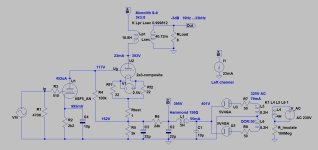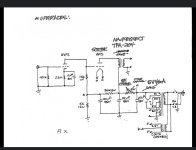I built the attached amplifier circuit using OPT’s with the specs indicated in the 2nd attachment, I paid pretty good money for these. My system is located in my small office which is 11’ x 12’ x 8’. Finally got around to running test-tones and saw that I’m not getting anything below 50hz and the low end starts rolling off at 100hz with my speakers. I can fill in the bottom end with my subwoofer. Just for grins I hooked up my mobile amp, a little Dayton T-amp which cost me all of $35. Without my subwoofer the low end is not missing with this little amp. Can anyone point me in the right direction on what could be causing the low end rolloff with my 2A3 amp?
Attachments
Where did you get the schematic? I am not getting it. 100k grid ref and no dc blocking cap. Why is the autobias resistor connected to the grid ref?
10u and 22uF are WAY too low they are going to significantly impact LF. 220uF for the driver and 100u for the 2A3.
10u and 22uF are WAY too low they are going to significantly impact LF. 220uF for the driver and 100u for the 2A3.
But you have -1dB at 20 Hz, is not bad!
If the graph is realistic.
And agree for the vales of cap
Walter
If the graph is realistic.
And agree for the vales of cap
Walter
These amps designed for efficient loudspeakers. It will behave badly with "any" speaker with 90dB or lower efficiency.I built the attached amplifier circuit using OPT’s with the specs indicated in the 2nd attachment, I paid pretty good money for these. My system is located in my small office which is 11’ x 12’ x 8’. Finally got around to running test-tones and saw that I’m not getting anything below 50hz and the low end starts rolling off at 100hz with my speakers. I can fill in the bottom end with my subwoofer. Just for grins I hooked up my mobile amp, a little Dayton T-amp which cost me all of $35. Without my subwoofer the low end is not missing with this little amp. Can anyone point me in the right direction on what could be causing the low end rolloff with my 2A3 amp?
BTW if you change the PSU (another rectifier, another load -the PSU designed for one channel!-), the output voltage collapses, B+ decreasing, the operating point drastically changing -due to the DC attaching).
BTW 2: the 5V4GA rectifier requiring at least 100R source (secondary coil) resistance, and operating with maximum 10uF first capacitor!
Sample of "bad" operating (even if the rectifier operating environment is OK):

p.s.
The "measuring" with the loudspeaker (sound pressure?) may be misleading, the ambience (room, furnitures etc.) can drastically change the results.
Try to measure the amp with dummy load.
Last edited:
It's only the OPT.But you have -1dB at 20 Hz, is not bad!
If the graph is realistic.
And agree for the vales of cap
Walter
I have 95dB efficient speakers with an easy 8ohm load. Plays plenty loud in my small office. Did some more research and I’m leaning towards the woofer damping. I hooked up the amp to my RCA LC-1 and it sounds marvelous with really defined, solid bass. Like I said the bass is there with the cheap SS T-amp.
These amps designed for efficient loudspeakers. It will behave badly with "any" speaker with 90dB or lower efficiency.
BTW if you change the PSU (another rectifier, another load -the PSU designed for one channel!-), the output voltage collapses, B+ decreasing, the operating point drastically changing -due to the DC attaching).
BTW 2: the 5V4GA rectifier requiring at least 100R source (secondary coil) resistance, and operating with maximum 10uF first capacitor!
Sample of "bad" operating (even if the rectifier operating environment is OK):
View attachment 1439154
p.s.
The "measuring" with the loudspeaker (sound pressure?) may be misleading, the ambience (room, furnitures etc.) can drastically change the results.
Try to measure the amp with dummy
You agree is ok or too low?But you have -1dB at 20 Hz, is not bad!
If the graph is realistic.
And agree for the vales of cap
Walter
I have 95dB efficient speakers with an easy 8ohm load. Plays plenty loud in my small office. Did some more research and I’m leaning towards the woofer damping. I hooked up the amp to my RCA LC-1 and it sounds marvelous with really defined, solid bass. Like I said the bass is there with the cheap SS T-amp.
So, the verdict is that the 2a3 amp works fine with the RCA LC-1 speakers? You know the Magnequest TFA-204 was among the least expensive OPT's they did.
Btw - if you want this amp to perform better, try a MOSFET follower after the 6sf5. Wimpy triodes like 6sf5 and 12ax7 don't drive the grid of the 2a3 well due to their high output impedance and correspondingly poor slew rate.
Yes, performs better with my RCA than my Altec Bolero’s. My amp is based off the schematic but I have made a few changes. The OT’s are Finemet types, much better quality than the TF-204 way more expensive. 5V3 rectifier. I’m using 46 tubes now. The OT’s are 3, 5 & 7k/8 or 16ohm secondaries. I wanted to try 45’s, 46’s and 2A3’s. I like the 46 best then the 2A3. I don’t understand electronics fully enough to implement a “mosfet follower” circuit.
Do you use #46 in place of 2A3? 😳
2A3 output impedance is 800R, #46 has 2380R.
2A3 requiring 2k5 OPT, for #46 the recommended value is 6k4.
Apples and oranges...
2A3 output impedance is 800R, #46 has 2380R.
2A3 requiring 2k5 OPT, for #46 the recommended value is 6k4.
Apples and oranges...
In #post 1 included 3k5 transformer is inadequate for #46 (for #45 also).
Finemet transformers usually has famously low inductance, 18H only 2262 Ohm impedance at 20Hz.
This is comparable to #46 Ri (2380R), so I am not surprised if you have impedance matching problems (which results FR problems) with different -impedance curve- crossovers.
"The OT’s are 3, 5 & 7k/8 or 16ohm secondaries."
It's means nothing in terms of operation.
Why not include the final operating environment?
p.s.
DC coupled equipments (mainly Loftin-White style) very sensitive to -stable- operating points. If you change components, must to redesign the whole amplifier (see in my #8 post).
Finemet transformers usually has famously low inductance, 18H only 2262 Ohm impedance at 20Hz.
This is comparable to #46 Ri (2380R), so I am not surprised if you have impedance matching problems (which results FR problems) with different -impedance curve- crossovers.
"The OT’s are 3, 5 & 7k/8 or 16ohm secondaries."
It's means nothing in terms of operation.
Why not include the final operating environment?
p.s.
DC coupled equipments (mainly Loftin-White style) very sensitive to -stable- operating points. If you change components, must to redesign the whole amplifier (see in my #8 post).
Last edited:
Why bring it up again? Are we not past post #1 with the OT’s which I gave you in post #15? Impedance mismatch? Means nothing? Interesting? Youcan not deduce from post #15 which tube goes with the particular primary? Which ones would you use for each tube?
46 tube 7k/8ohm
Vp: 228
I: 20.6mA
Dissipation: 4.69W
46 tube 7k/8ohm
Vp: 228
I: 20.6mA
Dissipation: 4.69W
- Home
- Amplifiers
- Tubes / Valves
- DC 2A3 SET Low Freq Rolloff

